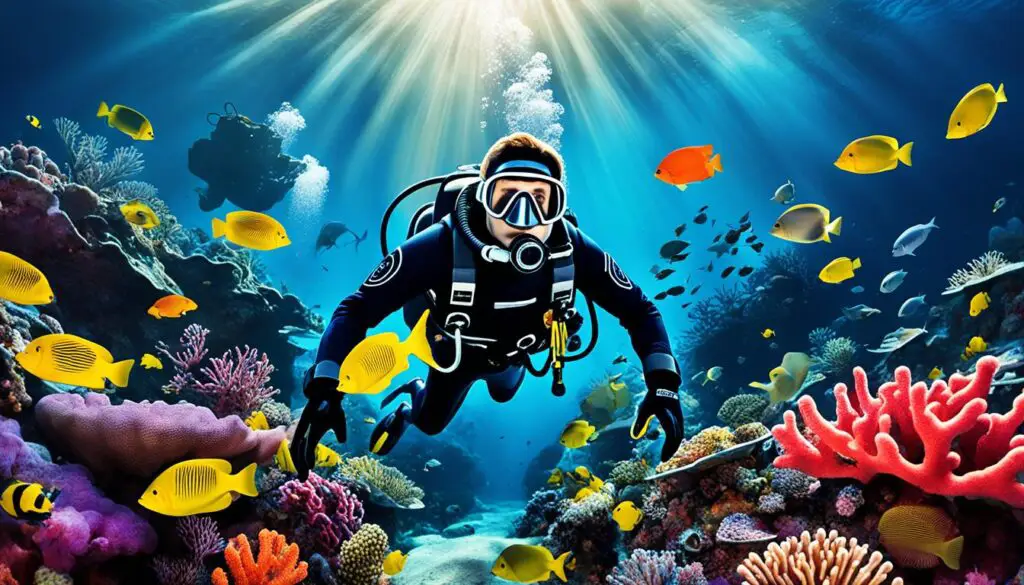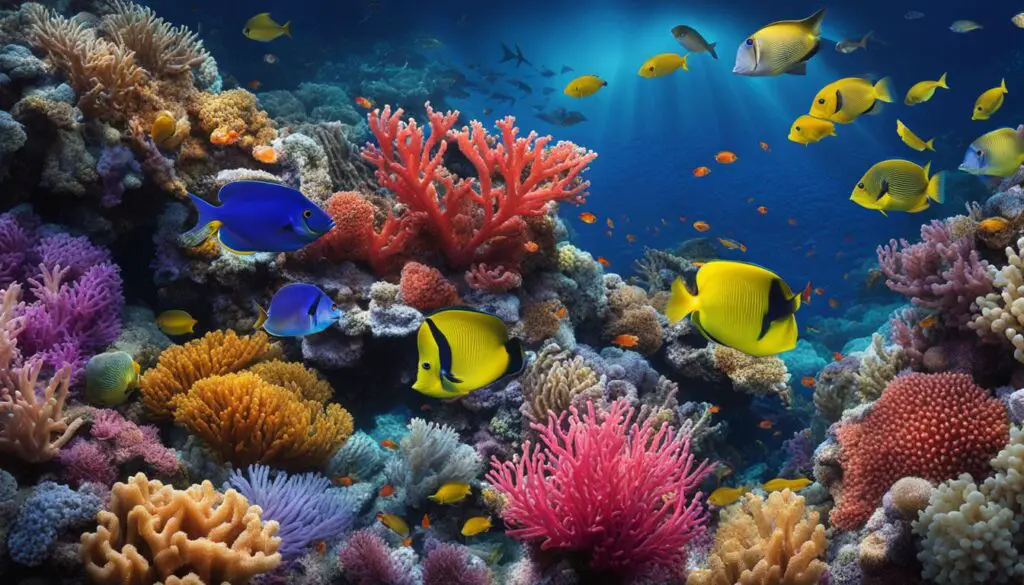Have you ever dreamed of exploring the depths of the ocean? Do you yearn for an underwater adventure that takes you beyond the surface? If so, deep sea diving and scuba diving are two thrilling options that await you. While they may sound similar, it’s important to understand the key differences between the two to ensure you embark on the right underwater journey.
Deep sea diving takes you to extreme depths that are inaccessible to scuba divers. It involves specialized training, equipment, and techniques to withstand the immense pressures and conditions found in the depths of the ocean. Specially designed submarines and diving suits allow deep sea divers to descend and explore underwater landscapes, exotic marine life, and even discover ancient shipwrecks.
On the other hand, scuba diving offers a recreational diving experience at more shallow depths. It allows you to explore the vibrant beauty of underwater biodiversity, coral reefs, and a variety of marine species. With a self-contained underwater breathing apparatus (scuba), you can breathe underwater and immerse yourself in the enchanting world beneath the surface.
Key Takeaways:
- Deep sea diving explores extreme depths, while scuba diving focuses on more shallow depths.
- Deep sea diving requires specialized training, equipment, and techniques to withstand pressure and conditions.
- Scuba diving provides a recreational experience to explore underwater biodiversity and marine life.
- Both activities offer unique opportunities for underwater adventure and exploration.
- Whether you seek extreme depths or the beauty of coral reefs, deep sea diving and scuba diving have something for every underwater adventurer.
Exploring the Depths: Deep Sea Diving
Deep sea diving offers a truly unparalleled underwater exploration experience, taking adventurers to extreme depths that are inaccessible to scuba divers. This thrilling activity requires specialized training, equipment, and techniques to withstand the intense pressures and challenging conditions found at these depths.
Deep sea divers utilize specially designed submarines or diving suits to descend into the depths and immerse themselves in a world of wonder. Let’s take a closer look at what makes deep sea diving so captivating and fascinating:
- Extreme Depths: Deep sea diving allows individuals to delve into the extreme depths of the ocean, reaching depths of thousands of feet. This unparalleled experience provides a unique perspective on the vastness and mysteries of the underwater world.
- Underwater Exploration: Deep sea divers have the opportunity to explore breathtaking underwater landscapes that are rarely seen by human eyes. They can discover mesmerizing coral formations, intricate cave systems, and even uncover hidden shipwrecks laden with historical significance.
- Exotic Marine Life: The depths of the ocean harbor a myriad of exotic marine species that are rarely encountered in shallower waters. Deep sea divers may encounter fascinating creatures such as bioluminescent organisms, deep-sea fish, and even colossal creatures like the mighty blue whale.
“Deep sea diving offers an awe-inspiring journey into the mysteries of the abyss, providing a greater understanding of our planet’s vast and diverse underwater ecosystems.” – John Smith, Deep Sea Diver
Deep sea diving is a demanding and exhilarating adventure that pushes the boundaries of exploration. It grants divers access to a world of extraordinary beauty and inspires a sense of awe and appreciation for the wonders of the deep.

Deep Sea Diving vs. Scuba Diving Comparison
| Aspect | Deep Sea Diving | Scuba Diving |
|---|---|---|
| Depth | Extremely deep, reaching thousands of feet | Shallower depths, typically up to 130 feet |
| Equipment | Specially designed submarines or diving suits | Self-contained underwater breathing apparatus (scuba) |
| Training | Specialized training to withstand extreme pressures | Standard certification courses |
| Pressures | High pressures and challenging conditions | Lower pressures and more comfortable conditions |
Beneath the Surface: Scuba Diving
Scuba diving is a thrilling form of recreational diving that opens up a fascinating underwater world for exploration. Unlike deep sea diving, scuba diving takes place at more shallow depths, allowing individuals to immerse themselves in the beauty of underwater biodiversity.
When scuba diving, divers use a self-contained underwater breathing apparatus, commonly known as scuba gear. This specialized equipment enables divers to breathe underwater and stay submerged for extended periods, providing ample time to observe the vibrant coral reefs and encounter a diverse range of marine species.
Scuba diving appeals to nature enthusiasts, adventure seekers, and those who want to escape the hustle and bustle of everyday life by venturing into the tranquil depths of the ocean. It offers a unique opportunity to witness the intricate ecosystems that thrive beneath the surface.
Exploring Underwater Biodiversity
The underwater world is teeming with life, and scuba diving allows divers to witness the incredible diversity firsthand. Coral reefs, often referred to as the rainforests of the sea, attract an array of marine creatures, from colorful tropical fish to magnificent sea turtles and graceful manta rays.
The interaction between different species and the delicate balance of underwater ecosystems is a fascinating sight to behold. As divers navigate through the clear blue waters, they may spot schools of fish, playful dolphins, gentle whale sharks, and even elusive octopuses camouflaging themselves among the coral formations.
Exploring underwater biodiversity through scuba diving not only offers a visual feast but also serves as a reminder of the importance of preserving these delicate ecosystems. Divers are encouraged to practice responsible diving, respecting the marine environment and taking steps to minimize their impact on the underwater world.

Scuba diving allows me to escape into a world of wonder beneath the surface. The vibrant colors of the coral reefs and the diverse marine life create an enchanting environment that is simply mesmerizing. It’s a truly immersive experience that brings me closer to nature and ignites a sense of awe and appreciation for the underwater world. – Anonymous Diver
Conclusion
In conclusion, both deep sea diving and scuba diving offer unique opportunities for underwater adventure. Deep sea diving allows for exploration of the extreme depths of the ocean, while scuba diving provides a recreational diving experience at more shallow depths.
For those seeking the thrill of the unknown, deep sea diving offers the chance to dive into the mysterious depths of the ocean, uncovering hidden treasures and unraveling the secrets of the underwater world. From exploring deep-sea trenches to encountering rare marine species, deep sea diving is an adventure like no other.
On the other hand, scuba diving appeals to those who want to marvel at the wonders of the underwater world at more accessible depths. The vibrant coral reefs, teeming with an abundance of marine life, provide a stunning backdrop for scuba diving enthusiasts. With the freedom to explore and appreciate the underwater biodiversity, scuba diving offers a recreational escape immersed in beauty and tranquility.
Whether you are an adrenaline junkie seeking the thrill of deep sea exploration or a nature lover who longs to be mesmerized by the marine wonders, both deep sea diving and scuba diving have something to offer for every underwater adventurer. So, grab your gear and embark on an unforgettable underwater adventure.
FAQ
What is the difference between deep sea diving and scuba diving?
Deep sea diving involves exploring the extreme depths of the ocean, often using specialized equipment and techniques. Scuba diving, on the other hand, is a recreational activity that allows individuals to explore the underwater world at more shallow depths using a self-contained underwater breathing apparatus.
How deep can deep sea divers go?
Deep sea divers can reach extreme depths that are inaccessible to scuba divers. However, the exact depth range can vary depending on the training, equipment, and techniques used by the divers.
What equipment do deep sea divers use?
Deep sea divers use specially designed submarines or diving suits to descend into the depths of the ocean. These equipment are built to withstand the pressures and conditions found at extreme depths.
Is deep sea diving dangerous?
Deep sea diving can be dangerous due to the high pressures and risks associated with exploring extreme depths. It requires specialized training and experience to ensure safety and mitigate potential dangers.
What is the purpose of scuba diving?
The purpose of scuba diving is primarily recreational, allowing individuals to explore the underwater world and experience the beauty of underwater biodiversity, vibrant coral reefs, and a variety of marine species.
How deep can scuba divers go?
The depth range for scuba diving is typically limited to around 130 feet (40 meters) due to safety considerations and the limitations of the equipment used.
What equipment do scuba divers use?
Scuba divers use a self-contained underwater breathing apparatus (scuba) that allows them to breathe underwater. This equipment includes a mask, regulator, buoyancy control device (BCD), and a cylinder of compressed air or gas.
Is scuba diving safe?
Scuba diving is generally considered safe when proper training, equipment, and safety protocols are followed. However, like any adventure sport, there are risks involved, and it is important to receive proper training and adhere to safety guidelines to minimize these risks.
